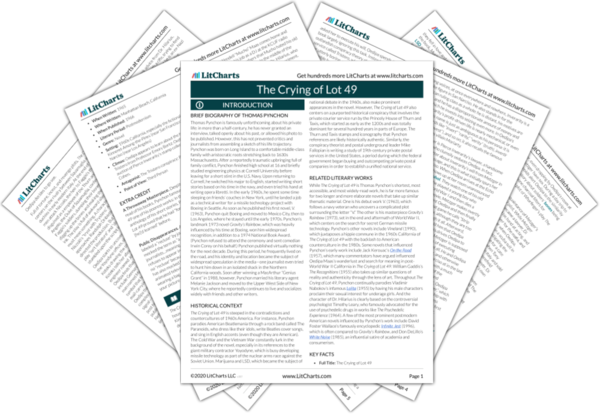A constant presence throughout The Crying of Lot 49, drugs and alcohol represent Pynchon’s characters’ futile attempts to escape their stagnant, unsatisfactory lives. Characters drink and use drugs in response to a reality so twisted that it actually seems unreal. But this does not rescue them: rather, it only alters their perceptions further and pushes them into an alternate reality where the sins of modern America—violence, social disconnection, and dispassion—are further amplified.
Oedipa Maas starts the novel inebriated from spiked fondue and drinks to try and escape her boredom in several scenes, ranging from her tryst with Metzger in the second chapter to her reckless drunk driving at the beginning of the last one. She meets important characters like Mike Fallopian and the Inamorati Anonymous member in bars, and the elderly sailor who reveals the W.A.S.T.E. system to her is an alcoholic hallucinating because of delirium tremens. While Oedipa learns to see the sailor’s perspective as one among others, like the perspectives of her husband Mucho and her therapist Dr. Hilarius when they lose their minds on LSD, all three of these characters become socially isolated and disconnected from reality. They represent the mirror image of Oedipa’s own fears, which center on her lack of relationships and sense that she is losing her mind as she descends into the Tristero conspiracy. Indeed, Oedipa soon realizes that the entire Tristero conspiracy might be a drug-induced hallucination: it would be no more bizarre than reality, which is totally crazy, too. Thus, drugs and alcohol represent Pynchon’s underlying argument that attempts to escape reality are futile and only end up reinforcing the very societal or personal failures that one is trying to leave behind.
Drugs and Alcohol Quotes in The Crying of Lot 49
One summer afternoon Mrs Oedipa Maas came home from a Tupperware party whose hostess had put perhaps too much kirsch in the fondue to find that she, Oedipa, had been named executor, or she supposed executrix, of the estate of one Pierce Inverarity, a California real estate mogul who had once lost two million dollars in his spare time but still had assets numerous and tangled enough to make the job of sorting it all out more than honorary. Oedipa stood in the living room, stared at by the greenish dead eye of the TV tube, spoke the name of God, tried to feel as drunk as possible. But this did not work.

Unlock explanations and citation info for this and every other The Crying of Lot 49 quote.
Plus so much more...
Get LitCharts A+She remembered John Nefastis, talking about his Machine, and massive destructions of information. So when this mattress flared up around the sailor, in his Viking’s funeral: the stored, coded years of uselessness, early death, self-harrowing, the sure decay of hope, the set of all men who had slept on it, whatever their lives had been, would truly cease to be, forever, when the mattress burned. She stared at it in wonder. It was as if she had just discovered the irreversible process. It astonished her to think that so much could be lost, even the quantity of hallucination belonging just to the sailor that the world would bear no further trace of.
Either you have stumbled indeed, without the aid of LSD or other indole alkaloids, onto a secret richness and concealed density of dream […] Or you are hallucinating it. Or a plot has been mounted against you […] all financed out of the estate in a way either too secret or too involved for your non-legal mind to know about even though you are co-executor, so labyrinthine that it must have meaning beyond just a practical joke. Or you are fantasying some such plot, in which case you are a nut, Oedipa, out of your skull.
Those, now that she was looking at them, she saw to be the alternatives. Those symmetrical four. She didn’t like any of them, but hoped she was mentally ill; that that’s all it was. That night she sat for hours, too numb even to drink, teaching herself to breathe in a vacuum. For this, oh God, was the void. There was nobody who could help her. Nobody in the world. They were all on something, mad, possible enemies, dead.












